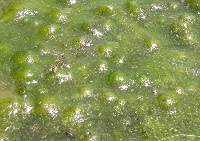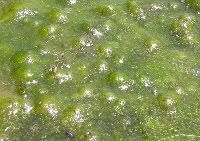Scripps Institution Speaks on Algae as Biofuel


Biofuels store chemical energy that is ultimately derived from the energy of the sun. This potential energy is carried in carbon bonds that are then oxidized (burned) to produce useful work, e.g., heat energy to warm our buildings or kinetic energy to drive our vehicles. As an alternative to growing plants in sunlight, algae can be fed macronutrients, but the energy in those nutrients comes ultimately from the sun as well. Dr. Mitchell favors algae over other forms of cellulosic biofuels because “small is efficient”; a given amount of biomass in algae contains 10 – 50 times more energy than the same mass of terrestrial plants. About 35% of the mass in algae is converted directly into biofuel, and most of the rest becomes useable food.
As I’ve written in the past, I have been openly skeptical of the wisdom of biofuels, since they themselves are hydrocarbons. Why make and burn more of them if we’re concerned about CO2 in the atmosphere? Dr. Mitchell acknowledged the intuitive merit of this idea (or was just being kind?). But he points out that there is a lot to like about algae. Here are few points I hadn’t considered. Algae:
- does not require arable land for production
- is irrigated with salt water
- can photosynthesize using CO2 that comes from an external and controlled source
Dr. Mitchell showed me that there is enormous promise as this industry develops. The challenge at this point is a combination of the technological and the financial. Right now, in fact, there is indeed no industry — nor should there be, he says, while we take the time to pose and resolve a few basic and vitally important questions, e.g., the exact species to be developed, the methods of production and harvest, and the modes of processing and distribution.
Fascinating stuff. And more coming soon.

[…] – Completed – Interview with Greg Mitchell , November 16, […]